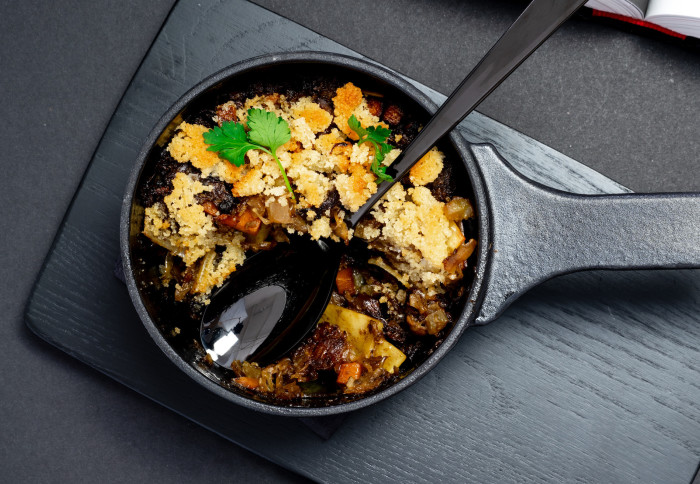Researcher and chef make ‘hyperfoods’ cookbook with disease-fighting ingredients

Photo credit: Kitchen Theory
An Imperial researcher and a chef have teamed up to create a cookbook of recipes using ‘hyperfoods’ – ingredients with anti-cancer molecules.
The free recipes are based on findings from the DRUGS research project, led by Dr Kirill Veselkov from Imperial’s Department of Surgery and Cancer, which uses artificial intelligence (AI) and machine learning to identify anti-cancer molecules in everyday foods. Such molecules are found in ingredients including carrots, celery, oranges, grapes, coriander, cabbage, turmeric and dill.

Dr Veselkov worked with chef Jozef Youssef to create recipes containing some of these ingredients in a new book called Hyperfoods. They wanted to demonstrate how people can easily incorporate hyperfoods into their diets and raise awareness of how food can improve people’s wellbeing and reduce chronic diseases. Hyperfoods is available to download for free on the Kitchen Theory website.
Recipes in the cookbook include roast carrot and chicken skewers with satay sauce, sauerkraut buckwheat pasta bake, and turmeric spiced hot chocolate. In each recipe there is a breakdown of which ingredients are hyperfoods, and how many anti-cancer molecules the dish contains.
In earlier research, Dr Veselkov’s team analysed data on the molecular content of more than 8000 everyday foods, identifying more than 110 cancer-fighting molecules. Many of these molecules are flavonoids, the huge class of compounds which help to give fruit and vegetables their colour. The project used DreamLab, an award-winning app developed by the Vodafone Foundation which takes the processing power of tens of thousands of smartphones being charged overnight to create a ‘virtual supercomputer’ to crunch data quickly and speed up scientific research.
Dr Veselkov said: “We are seeing a continuous growth in chronic conditions such as cancer, neurological diseases and heart disorders. A key contributing factor is poor dietary choices; studies suggest that unhealthy diets are responsible for a fifth of deaths globally and it’s estimated that almost half of all cancers could be prevented by good dietary and lifestyle choices. The fact that our research was powered by the Vodafone Foundation’s DreamLab app enabled the public to get involved and make a difference which has been fantastic.”

Kitchen Theory Chef Jozef Youssef said: “While we are some way from offering prescription or personalised diets, this seminal research - and subsequent recipes - are an important step in understanding how we can choose food more intelligently to improve our health. The recipes in this book were created to show people how to use the disease-beating ingredients highlighted in the research to create healthy and delicious dishes and drinks. I hope people will be inspired to create their own!”
Dr Michael Bronstein, from Imperial’s Department of Computing, who was also involved in the research, said: “Hyperfoods is the first attempt to apply network-based AI to simulate the health effects of biologically active molecules in foods. By modelling the ‘network effects’ of the interactions between food-based molecules and biomolecules in our body, we can identify which foods contain ingredients that might work in a similar way to medical drugs and have the potential to prevent or beat diseases. Our ambition is to provide a quantum leap in how our food is ‘prescribed’, designed and prepared - and this is a great first step.”
The cookbook is not intended to be used as a source of medical advice. The researchers caution that the relationship between food components and health remains an emerging field of study and further clinical research is needed.
As well as continuing to power research into cancer, the DreamLab app is now supporting Imperial College London research into whether foods and pre-existing drug combinations could be used to treat COVID-19. When the research is complete, it will be released to the medical profession to facilitate clinical trials. Any food-related findings will be translated into dietary advice that can be implemented by the medical community for patients recovering from Covid-19.
A TedX talk about hyperfoods, by Kirill Veselkov and Michael Bronstein, is available on YouTube. There will also be an interview with Dr Veselkov and Jozef Youssef in the next edition of the Imperial College Podcast, which will be available from 23 September.
Article text (excluding photos or graphics) © Imperial College London.
Photos and graphics subject to third party copyright used with permission or © Imperial College London.
Reporter
Laura Gallagher
Communications Division